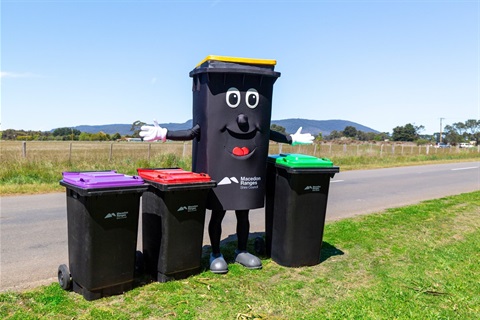Four-bin system

The four-bin collection service started on 3 February 2020 in major townships and was rolled out in remaining areas of the shire in July 2021.
The four-bin system consists of:
This service aligns with the objectives and goals of the Waste and Resource Recovery Management Strategy 2021-2026. The central focus of the strategy is the diversion of waste from landfill.
The Kerbside Collection and Associated Services Charge Policy outlines how the four-bin service works.
Why the four-bin system?
Under the Victorian Government’s Circular Economy Policy released in February 2020, all Victorian councils must have a standard four-bin system or equivalent by 2030 to achieve more and better recycling and less landfill.
Additionally, Victoria is running out of landfill space, which can increase the cost to dispose of waste, which attracts a fee known as the ‘EPA Waste levy’. This cost is passed directly onto ratepayers through the waste charge on your rates notice. By introducing the four-bin system, we can minimise future cost increases by diverting materials away from landfill.
Achievements so far
We are one of the first councils in Victoria to have introduced a four-bin system, and in February 2024 we celebrated four years of the new service.
- 37,012 tonnes of FOGO material was sent to Biomix in Stanhope and is being turned into Australian standard compost.
- 10,668 tonnes of recycling was sent to APR in Truganina for processing of paper/cardboard, steel, aluminium and hard plastic.
- 6,975 tonnes of glass was sent to ASQ in Bendigo and is being repurposed into road base materials.
This means the Shire has diverted over 54,000 tonnes of waste from landfill!
Monthly landfill diversion rate has increased from 39 percent in January 2020 (pre-introduction) to 74 percent, which is much higher than the average Victorian municipal diversion rate of 45 percent recorded for 2019/20.
Together we can continue to reduce waste to keep our Shire beautiful and sustainable.
Kerbside waste audit results
In July 2024, an independent review examined bins from 375 randomly selected properties, analysing 125 bins from each waste stream (excluding glass). In total, four tonnes – or 50,000 litres – of organics, recycling, and landfill materials were assessed for weight and contamination (items placed in the wrong bin).
Key findings
- Each household produced an average of 5.97kg (55.05L) of rubbish/general waste (red lid bins) per week. The contamination rate was 17.2 per cent by weight (31.5 per cent by volume), with recyclable and FOGO items found to be the main contaminants in bins.
- Each household produced an average of 3.1kg (80.4L) of recycling per week (yellow lid bins). The contamination rate was 25 per cent by weight (13.8 per cent by volume), with landfill items found to be the main contaminant in recycling bins.
- Each household produced an average of 13.9kg (126.4L) of mixed organics per week (green lid bins). The contamination rate was 2.5 per cent by weight (4 per cent by volume). Food waste in non-compostable packaging was found to be the main contaminant.
What can we do to reduce bin contamination?
The audit results indicate that residents in the Macedon Ranges perform well in using green and yellow-lidded bins, but have room for improvement in sorting waste for red-lidded bins. By reducing contamination in bins, we can help to prevent valuable reusable materials going to landfill.
To support ongoing education around the types of materials that go in each bin, Council has developed a new suite of engaging and educational videos, elaborating on the journey of different waste and recycling streams once they leave the house.
Kerbside waste audit results (2024)(PDF, 2MB)
Recycle right
The good recycling habits campaign ran for select months in 2023 and 2024.
Did you receive a Kerby sticker?
Receiving a Kerby sticker on one of your bins means that you're a great recycler, thanks for sorting your waste right!
For more information on good recycling habits visit our Waste A-Z guide or call (03) 5422 0333.